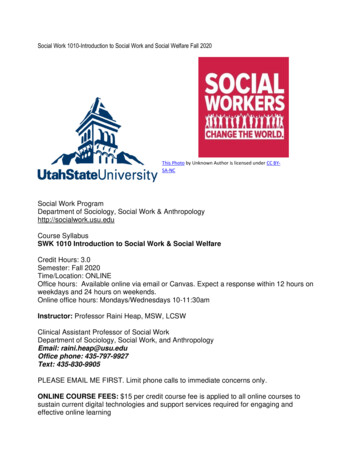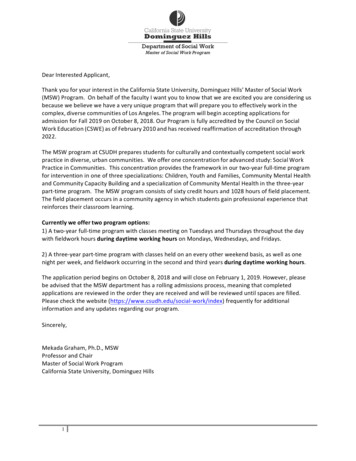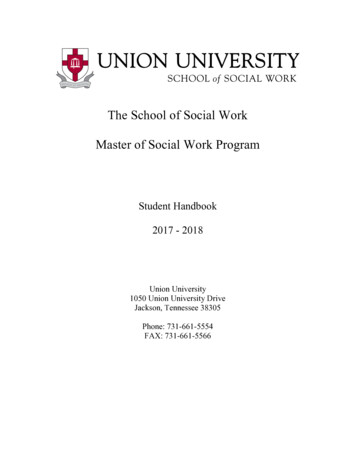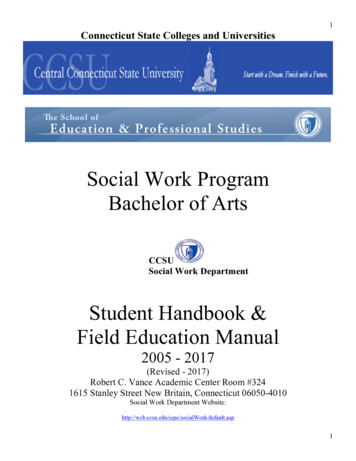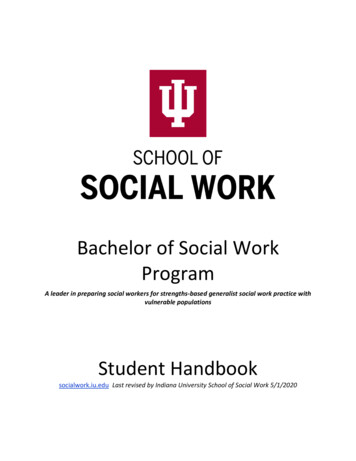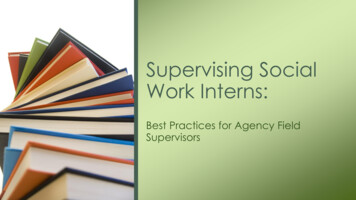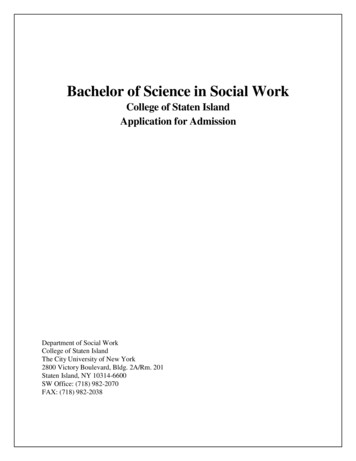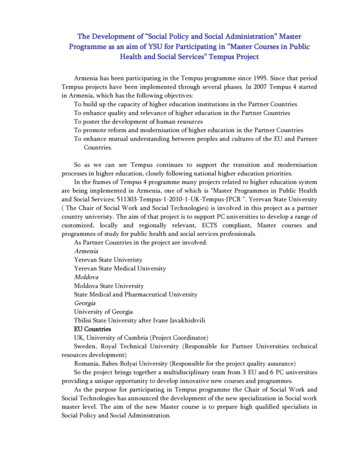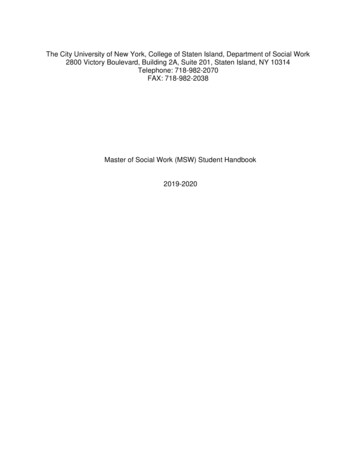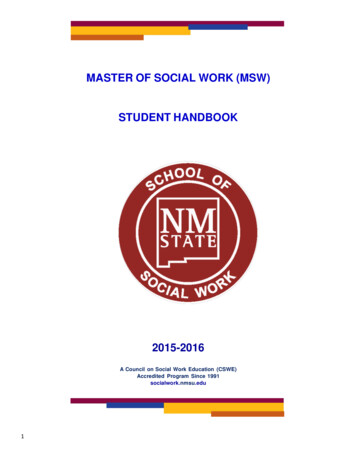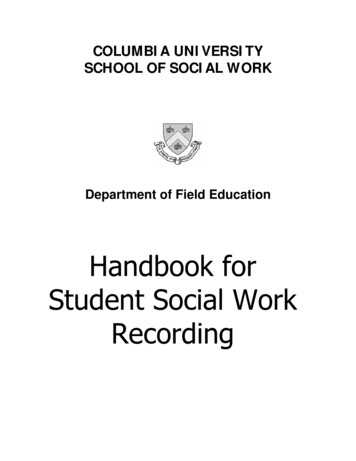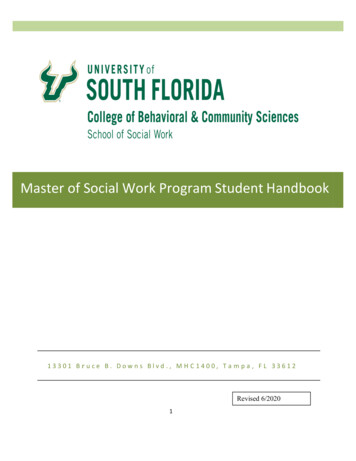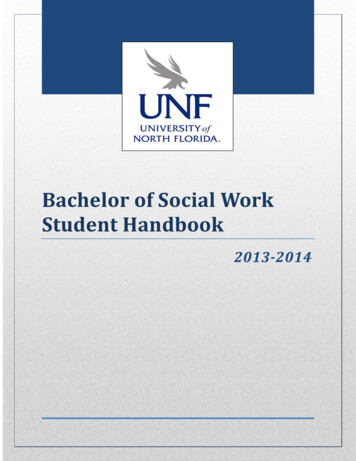
Transcription
Bachelor of Social WorkStudent Handbook2013‐2014
UNF BSW Student HandbookRevised 08/21/13TABLE OF CONTENTSUSING THE UNF BSW STUDENT HANDBOOKIntroduction & Overview . .2Note Regarding Academic Policies . .2THE BACHELOR OF SOCIAL WORK (BSW) PROGRAMMission . .3Goals .3Competencies 3Faculty 6ADMISSIONSEqual Opportunity & Diversity Statement 8Admission Criteria . .8Admission Procedures . 9Transfer Students . . .10New Student Orientation . . 10THE BSW CURRICULUMProgram of Study . .11Course Descriptions . .12Field Education . . 17Honors in Social Work . .17Directed Independent Studies . 17GRADUATION REQUIREMENTS . 19ACADEMIC POLICIESAcademic Standards . .20Academic Integrity Code & Academic Misconduct Policies . .20Student Conduct . 21Academic and Personal Conduct Contract . 21Termination from the Program . .22Incomplete Grades . .22Grade Appeals & Grievances . .23Americans with Disabilities Act/Military & Veteran Students . 23STUDENT ORGANIZATIONSSocial Work Club . .25Phi Alpha Honor Society for Social Work . .25STUDENT RESOURCES . .261
UNF BSW Student HandbookRevised 08/21/13USING THE UNF BSW STUDENT HANDBOOKIntroduction & OverviewWelcome to the University of North Florida (UNF) Bachelor of Social Work (BSW)Program! The information contained in this handbook is intended to help yousuccessfully navigate your BSW Program of Study. You will find detailed descriptionsof academic and professional performance requirements as well as a variety of studentresources available to you on the UNF campus. BSW students are required to adhere tothe policies and procedures described in this handbook. If you have questions orconcerns regarding the BSW Program’s policies and procedures, please do not hesitateto contact the BSW Program Director or the Chair of the Department of Sociology andAnthropology.Note Regarding Academic PoliciesWe make every effort to ensure that the policies contained in the UNF BSW StudentHandbook are up to date and in accordance with University policies. In the event thatthe policies contained in this Handbook conflict with official University policies, theUniversity’s policy will supersede this document. Students should also be aware thatsome policies, such as graduation requirements, are linked to the student’s catalog year(typically the year a student was admitted to the University or to the major). Thus twostudents in the same program may be subject to different requirements. For this reason,we encourage you to meet regularly with your College of Arts and Sciences (COAS)Advisor to ensure that you are aware of and on track to meet all University graduationrequirements. Your COAS Advisor can also provide insight on other Universitypolicies.“What after all has maintained the human race on this old globedespite all the calamities of nature and all the tragic failingsof mankind, if not faith in new possibilities and courage toadvocate for them.” –Jane Addams2
UNF BSW Student HandbookRevised 08/21/13THE BACHELOR OF SOCIAL WORK (BSW) PROGRAMMissionThe mission of the University of North Florida (UNF) Bachelor of Social Work (BSW)program is to prepare students with the generalist knowledge, values, and skills toprovide effective social work services to diverse client systems in a variety of practicesettings. Our curriculum is designed to enhance students’ understanding of andsensitivity to economic and social inequalities and foster commitment to serving andadvocating for the well-being of those who are vulnerable, marginalized, andoppressed.GoalsIn accordance with our mission, the BSW program aims to1) offer a curriculum grounded in the liberal arts and informed by state of the artsocial work knowledge that prepares students for effective generalist social workpractice with diverse clients systems in a variety of practice settings;2) enhance students’ understanding of and sensitivity to economic and socialinequalities, fostering commitment to serve and advocate for those who arevulnerable, marginalized, and oppressed;3) prepare students to engage self-critically in practice evaluation as well as lifelongpersonal and professional growth through the development of research, criticalthinking and problem-solving skills; and4) socialize students to the values and ethics of the social work profession.CompetenciesAs dictated by the CSWE’s (2008) Educational Policy & Accreditation Standards, allUNF BSW students will demonstrate the following ten core competencies.1) Identify as a professional social worker and conduct oneself accordingly.Social workers serve as representatives of the profession, its mission, and its corevalues. They know the profession’s history. Social workers commit themselves tothe profession’s enhancement and to their own professional conduct and growth.2) Apply social work ethical principles to guide professional practice.Social workers have an obligation to conduct themselves ethically and to engagein ethical decision-making. Social workers are knowledgeable about the valuebase of the profession, its ethical standards, and relevant law.3
UNF BSW Student HandbookRevised 08/21/133) Apply critical thinking to inform and communicate professional judgments.Social workers are knowledgeable about the principles of logic, scientific inquiry,and reasoned discernment. They use critical thinking augmented by creativityand curiosity. Critical thinking also requires the synthesis and communication ofrelevant information.4) Engage diversity and difference in practice.Social workers understand how diversity characterizes and shapes the humanexperience and is critical to the formation of identity. The dimensions of diversityare understood as the intersectionality of multiple factors including age, class,color, culture, disability, ethnicity, gender, gender identity and expression,immigration status, political ideology, race, religion, sex, and sexual orientation.Social workers appreciate that, as a consequence of difference, a person’s lifeexperiences may include oppression, poverty, marginalization, and alienation aswell as privilege, power, and acclaim.5) Advance human rights and social and economic justice.Each person, regardless of position in society, has basic human rights, such asfreedom, safety, privacy, an adequate standard of living, health care, andeducation. Social workers recognize the global interconnections of oppressionand are knowledgeable about theories of justice and strategies to promote humanand civil rights. Social work incorporates social justice practices in organizations,institutions, and society to ensure that these basic human rights are distributedequitably and without prejudice.6) Engage in research-informed practice and practice-informed research.Social workers use practice experience to inform research, employ evidencebased interventions, evaluate their own practice, and use research findings toimprove practice, policy, and social service delivery. Social workers comprehendquantitative and qualitative research and understand scientific and ethicalapproaches to building knowledge.7) Apply knowledge of human behavior and the social environment.Social workers are knowledgeable about human behavior across the life course;the range of social systems in which people live; and the ways social systemspromote or deter people in maintaining or achieving health and well-being.Social workers apply theories and knowledge from the liberal arts to understandbiological, social, cultural, psychological, and spiritual development.8) Engage in policy practice to advance social and economic well-being and todeliver effective social work services.Social work practitioners understand that policy affects service delivery, andthey actively engage in policy practice. Social workers know the history and4
UNF BSW Student HandbookRevised 08/21/13current structures of social policies and services; the role of policy in servicedelivery; and the role of practice in policy development.9) Respond to contexts that shape practice.Social workers are informed, resourceful, and proactive in responding toevolving organizational, community, and societal contexts at all levels ofpractice. Social workers recognize that the context of practice is dynamic, and useknowledge and skill to respond proactively.10) Engage, assess, intervene, and evaluate with individuals, families, groups,organizations, and communities.Professional practice involves the dynamic and interactive processes ofengagement, assessment, intervention, and evaluation at multiple levels. Socialworkers have the knowledge and skills to practice with individuals, families,groups, organizations, and communities. Practice knowledge includesidentifying, analyzing, and implementing evidence-based interventions designedto achieve client goals; using research and technological advances; evaluatingprogram outcomes and practice effectiveness; developing, analyzing, advocating,and providing leadership for policies and services; and promoting social andeconomic justice.“Social work is all about leaning into the discomfort ofambiguity and uncertainty, and holding open an empathicspace so people can find their own way.”–Brené Brown, Ph.D., LMSW5
UNF BSW Student HandbookRevised 08/21/13FacultyRoss McDonough, MSW, LCSW, CAPInstructor & Field Education DirectorBuilding 3, Room 2206(904) 620-1653r.mcdonough.118395@unf.eduProfessor McDonough earned his MSW from New York University in the Clinical SocialWork Program. He holds a license credential (Licensed Clinical Social Worker) in theState of Florida to practice psychotherapy and Clinical Social Work. He also holds acertification credential (Certified Addiction Professional) to provide substance abusetreatment and evaluations in the State of Florida.Professor McDonough has over ten years of Clinical Social Work practiceexperience. He has worked with many populations (i.e., children, teens, adults,couples, families and groups) in several different practice settings, including hospitals,non-profit organizations, residential treatment facilities, outpatient clinics and inprivate practice. One of his clinical interests is holistic family intervention withOppositional Defiant Disorder. He also specializes in family conflict and loyalty bindsin divorced families.Currently Professor McDonough is an Instructor and the Field Education Director forthe BSW program. He has been a full-time Instructor at UNF since 2011 and lectured asan Adjunct Instructor for the two years prior.Jennifer Spaulding-Givens, Ph.D., MSWAssistant Professor & BSW Program DirectorBuilding 3, Room 2203(904) 620-1640j.spaulding-givens@unf.eduDr. Spaulding-Givens earned a Ph.D. in Social Work from Florida State University,where she also received a Master of Social Work degree with a concentration in SocialPolicy and Administration. Prior to joining the UNF Faculty, Dr. Spaulding-Givensserved as the Operations Coordinator of Florida Self-Directed Care, a public mentalhealth program for indigent adults diagnosed with a severe and persistent mentalillness.Dr. Spaulding-Givens’ current research agenda is devoted to an examination of the selfdirected care service delivery model. Her teaching interests range from the history andanalysis of social welfare policy to social work practice, administration, and programevaluation. She routinely teaches Social Welfare Institutions, Social Work Practice with6
UNF BSW Student HandbookRevised 08/21/13Organizations and Community, and Inside the Asylum: A History of AmericanPsychiatry.Currently Dr. Spaulding-Givens is an AssistantProfessor and the BSW Program Director. She hasbeen a member of the UNF faculty since 2006.Suzie S. Weng, PhD, MSWAssistant Professor of Social WorkBuilding 3, Room 2210Office: (904) 620-5424s.weng@unf.eduDr. Weng received her PhD in social work fromVirginia Commonwealth University (VCU). She alsoearned her Master’s in Social Work from VCU with aconcentration in administration, planning, and policypractice and a certificate in nonprofit management.She received her Bachelor of Arts from BowdoinCollege with a major in history.“Never regard study as aduty, but as the enviableopportunity to learn to knowthe liberating influence ofbeauty in the realm of thespirit for your own personaljoy and to the profit of thecommunity to which yourlater work belongs."—Albert EinsteinDr. Weng’s area of research is on access to services, informal support networks, andethnic-specific services for immigrant and refugee populations. Prior to becoming afaculty member at UNF, she taught BSW and MSW courses at VCU, including socialwelfare legislation and policy, data analysis, research for planning and administrativepractice, social justice, and social work with oppressed groups. Dr. Weng has practiceexperience working for Teach for America, Communities in Schools, a domesticviolence center, a lobbying firm, and Asian American community organizations.Dr. Weng is currently an Assistant Professor of Social Work. She joined University ofNorth Florida as a faculty member in August 2013.7
UNF BSW Student HandbookRevised 08/21/13ADMISSIONSEqual Opportunity & Diversity Statement1The University of North Florida is committed to providing an inclusive and welcomingenvironment for all who interact in our community and strives to attract students,faculty and staff from a variety of cultures, backgrounds and life experiences. Whileembracing these concepts including its obligations under affirmative action regardingrace, ethnicity and gender, the University is equally committed to ensuring thateducational and employment decisions, including recruitment, admission, hiring,compensation and promotion, are based on qualifications, skills and abilities of thosedesiring to work, study, and participate in out University community.To accomplish the intent of this regulation, the University shall not commit or permitdiscrimination or harassment on the basis of race, color, national origin, gender, sexualorientation, religion, age, disability, marital status, veteran status, or any other basisprotected by state and federal law, in any educational, employment, social orrecreational program or activity, including athletics, offered by the University.Similarly, the University will not commit or permit retaliation against an individualwho complains of discrimination or harassment or an individual who cooperates in aninvestigation of an alleged violation of this regulation.The responsibility for providing leadership and guidance with respect to this regulationrests with the Director, Office of Equal Opportunity and Diversity, University of NorthFlorida, J.J. Daniel Hall, Suite 1201, 1 UNF Drive, Jacksonville, Florida 32224-2645, (904)620-2507 Voice; (904) 620-1004 Fax or TTY, ASCII, Voice, VCO-Direct, STS: 711 viaFlorida Relay.“Diversity makes for a rich tapestry. We must understand that allthe threads of the tapestry are equal in value, no matter theircolour; equal in importance no matter their texture.”- Maya AngelouAdmission CriteriaThe UNF BSW Program is a limited access program to which a cohort of 40 studentswill be admitted on an annual basis. Students, who wish to be admitted to the UNFBSW program, must meet the following admission requirements: 1Acceptance to UNF;http://www.unf.edu/president/policies regulations/01-General/1 0040R.aspx8
UNF BSW Student Handbook Revised 08/21/13An AA from a public Florida college or university or successful completion ofUNF general education requirements; students transferring to UNF without anAA must have 60 credit hours;A minimum cumulative GPA of 2.5;Completion of 15 hours of common prerequisites (listed below) with a C orbetter;Successful participation in a panel interview conducted by a committee of SocialWork and Sociology faculty and community partners; and,Acceptable performance on a writing assessment administered and reviewed bya committee of Social Work and Sociology faculty.Prior to being admitted to the BSW program, students must successfully complete 15hours of state-mandated common pre-requisites with a C or better. Select one course ineach of the following disciplines (UNF course offerings are listed; equivalent coursesfrom other institutions are also acceptable): Political Science (3 credit hours)o POS 2041 Introduction to American GovernmentHuman Biology (3 credit hours)o BSC 1005C Principles of Biologyo BSC 2085C Anatomy & Physiology Io BSC 1010C General Biology IPsychology (3 credit hours)o PSY 2012 Introduction to PsychologySociology (3 credit hours)o SYG 2000 Introduction to SociologyEconomics (3 credit hours)o ECO 2013 Principles of Macroeconomicso ECO 2023 Principles of MicroeconomicsAdmission ProceduresAll applications to the UNF BSW Program will first be screened by the ProgramDirector for the minimum qualifications as outlined above. Applicants who do not meetthe minimum requirements will not be considered further. Applications reflecting theminimum qualifications will be further reviewed to identify a pool of applicants to beinvited to participate in panel interviews and complete a writing assessment.Interviews will be conducted on campus by an admissions committee chaired by theProgram Director and including other Social Work faculty, faculty from theDepartment’s Sociology program and/or community partners. Applicants will bequestioned and rated regarding their suitability to the profession of social work,commitment to the program, and level of preparation. Students will also be required tocomplete a writing assessment administered on campus and reviewed by facultymembers of the admissions committee. Students’ writing samples will be rated as9
UNF BSW Student HandbookRevised 08/21/13Below Expectations, Meets Expectations, or Exceeds Expectations. Based on theirinterview and writing assessment scores and academic records, applicants will beranked and then notified via email that they are either accepted to the program, waitlisted (students will be told their place on the wait list and notified via email if andwhen an admitted applicant declines his or her place), or not accepted. Students whoare wait listed or not accepted will be invited to apply the following year.Transfer StudentsThe UNF BSW Program adheres to all University2 and College3 level policies regardingtransfer of credits. Only two courses in the major (6 credit hours) may be transferred,unless the Department Chair grants an exception. The University’s baccalaureatedegree requirements4 also specify the minimum hours required to meet the University’sresidency requirement.Students must consult with the University’s professional advisors and the BSWProgram Director to ensure that courses taken at other CSWE-accredited institutions areequivalent (this requires a review of the transcript and course syllabi). Courses deemednot equivalent to UNF’s courses may not be applied to the UNF BSW program of study.UNF’s BSW program will not accept Social Work courses from non-CSWE-Accreditedprograms. It is the policy of the UNF BSW program to deny transfer of practicum orinternship credits.UNF’s BSW Program does not grant social work course credit for life experience orprevious work experience.New Student OrientationAll new BSW students are required to attend a mandatory, three-hour orientation priorto the first semester of their BSW Program of Study. This orientation will pr
Suzie S. Weng, PhD, MSW Assistant Professor of Social Work Building 3, Room 2210 Office: (904) 620-5424 s.weng@unf.edu Dr. Weng received her PhD in social work from Virginia Commonwealth University (VCU). She also earned her Master’s in Social Work from VCU wit
